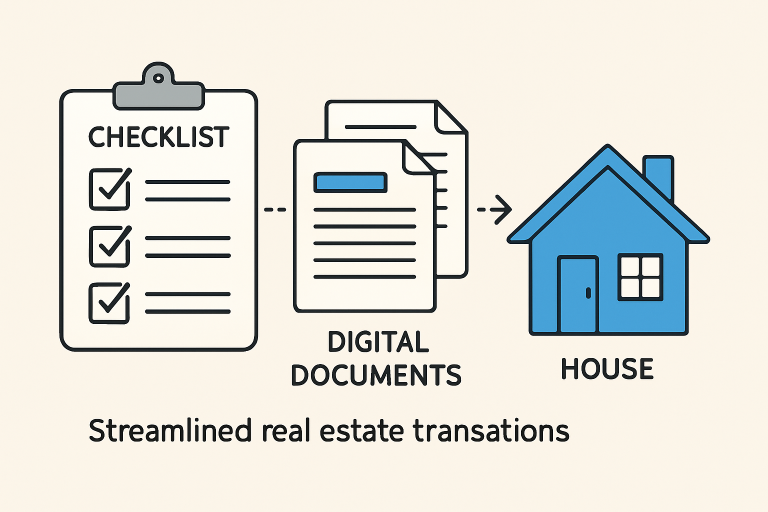Key Takeaways
- Utilize digital tools to streamline documentation and communication.
- Maintain clear and consistent communication among all parties.
- Engage experienced professionals to guide you through the process.
- Stay informed about market trends and legal requirements.
Table of Contents
- Leveraging Digital Tools for Efficiency
- Establishing Clear Communication Channels
- Seeking Professional Guidance
- Staying Informed About Market Trends
- Ensuring Legal Compliance
- Utilizing Comprehensive Checklists
- Incorporating Virtual Tours
- Final Thoughts
Managing a real estate transaction can be intimidating, even for the most seasoned buyers and sellers. The intricate sequence of documents, deadlines, and decisions can make any deal feel overwhelming. Yet, by following a clear, streamlined system, these complexities can become manageable and even efficient—enabling all parties to focus on their goals rather than the red tape. Leveraging modern transaction coordination services, such as https://transactioncoordinator.com/, can make administrative tasks seamless and transparent, providing greater control over each stage of the process.
Today’s market offers tools and expert guidance that, when harnessed thoughtfully, help both buyers and sellers avoid common pitfalls. These steps address not only technical details but also the logistics and communication that underpin a smooth closing. By working proactively and using reliable support services, clients can stay ahead of deadlines, mitigate risk, and achieve more favorable outcomes.
Modern technology, combined with experienced professional assistance, ensures you are never left in the dark at any step. Establishing clear channels for updates, document exchanges, and property viewing can dramatically reduce stress and increase satisfaction for all parties. Whether handling a single-family sale or a complex investment transaction, these essential strategies lay the groundwork for success.
One component not to overlook is the use of dedicated transaction coordination resources. Engaging platforms like https://transactioncoordinator.com/ can significantly enhance your experience by streamlining document tracking, compliance, and communication, resulting in a smoother and faster transaction from start to finish.

Leveraging Digital Tools for Efficiency
Digital platforms have transformed the real estate industry, making the once paper-heavy process far more efficient. E-signature solutions enable all parties to sign off on important documents remotely and securely. At the same time, cloud-based management systems facilitate easy uploading, storage, and sharing of documents, ranging from contracts to disclosures. These tools create a digital audit trail, help reduce errors, and significantly reduce the time traditionally spent reviewing paperwork. This efficiency can give you a competitive edge, especially in fast-moving markets where time is of the essence. According to Business Money, integrating advanced technology platforms into every aspect of the sales cycle has become a hallmark of top-producing agents and brokerages.
Establishing Clear Communication Channels
Miscommunication is a frequent cause of frustration and delays in real estate transactions. Setting expectations through structured intake forms and regular status updates is essential. Digital client portals, email and text updates, and team messaging platforms ensure no one is left out of the loop. Open lines of communication foster trust, expedite decision-making, and ensure each transaction progresses on schedule. Agents are also increasingly using collaborative workspaces, such as Slack or Microsoft Teams, to communicate in real-time, resolve questions quickly, and share important updates and documents across teams.
Seeking Professional Guidance
Legal experts and experienced real estate professionals bring vital insights and protections to any transaction. With real estate regulation differing across states and even localities, engaging professionals who thoroughly understand disclosure obligations, zoning rules, and regulatory requirements is crucial. A seasoned real estate advisor can provide data-driven guidance, helping you price properties accurately, negotiate terms effectively, and avoid costly legal disputes. Moreover, legal counsel ensures your contracts are enforceable and compliant with all current laws, helping to prevent issues that could delay or derail your closing.
Staying Informed About Market Trends
Staying up to date on local housing trends empowers buyers and sellers to make informed choices. Reviewing recent sales, active listings, and average days on market offers valuable clues for pricing strategy and timing. Tools such as Comparative Market Analysis (CMA) reports provide concrete data for setting expectations and increasing deal success. According to Zillow Research, monitoring seasonal variations and buyer demand enables sellers to maximize value and buyers to seize the best opportunities as they arise.
Ensuring Legal Compliance
Verifying property titles, performing comprehensive lien searches, and confirming boundaries via proper surveys are essential legal steps. Title insurance policies, deed reviews, and careful checks of public records protect both buyers and sellers from legal complications later. Overlooking this step can lead to disputes, delays, or even the collapse of a sale. By thoroughly reviewing legal documentation and verifying compliance, you ensure that property transfers are valid and binding, safeguarding your investment.
Utilizing Comprehensive Checklists
Detailed checklists keep every member of the transaction team organized and accountable. Outlining deadlines for appraisals, inspections, and loan commitments helps everyone involved stay on track and ensures no crucial step is missed. Comprehensive task lists are invaluable for tracking the status of documentation, required repairs, or staging, giving everyone confidence that nothing will be overlooked before closing day.
Incorporating Virtual Tours
Virtual tours have revolutionized the property viewing process, enabling prospective buyers to evaluate homes remotely at their own convenience. These immersive experiences filter out less-serious interest, allowing agents to focus on qualified, motivated buyers. In a digital-first marketplace, offering high-quality virtual tours enables a broader audience reach, streamlines the showing process, and ultimately increases the chances of a successful transaction.
Final Thoughts
Simplifying real estate transactions is a multifaceted effort that involves technology, clear communication, expert support, and rigorous documentation. By adopting these essential steps—especially with the help of reliable tools and services—buyers and sellers can reduce uncertainty and achieve their real estate goals with confidence and peace of mind.







